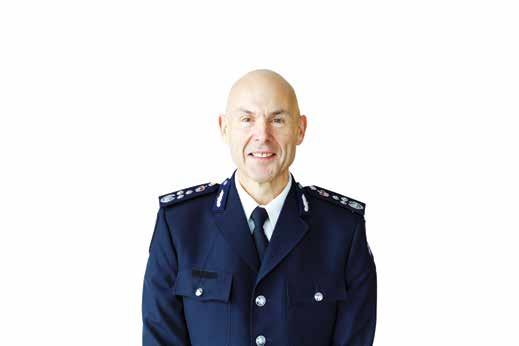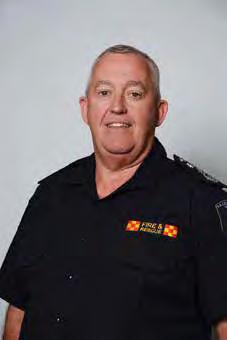
9 minute read
View from the top: leading under pressure
PHOTO: AFAC
VIEW FROM THE TOP: LE ADING UNDER PRESSURE
The commissioners and chief officers from jurisdictions most affected during the 2019–20 bushfire season shared their insights on leadership and pressure in the 2020 Knowledge Event Series.
BY AL ANA BEITZ
AFAC
ne of the key functions of AFAC is to collaborate and
Oshare knowledge. This is the aim of the Knowledge Event Series, held annually across nine locations in Australia and New Zealand, supported by the Motorola Solutions Foundation.
The theme for the 2020 Knowledge Event Series was: ‘Leading under pressure: how our leaders manage themselves and their agencies during intense and sustained operational periods’.
Due to COVID-19 restrictions, the event was held virtually and focused on the experiences of Australian fire agency commissioners and chief officers. AFAC CEO Stuart Ellis remarked that it was a fitting adjustment following the scale and intensity of the Black Summer bushfires in 2019–20.
“Historically we have invited overseas speakers to talk about events and developments across the globe. Of course, that has not been possible in 2020, and so we have looked inward, we have looked to our own chiefs and commissioners, and I’m so glad we have, because we have received insights from four chiefs and commissioners who were heavily impacted by the season just past.”
Four chief officers and Above: The NSW Rural Fire Ser vice State Control Centre during the 2019–20 bushfire response.
commissioners shared their professional and personal pressures relating to the 2019–20 bushfire season: Queensland Fire and Emergency Ser vices Commissioner Greg Leach; Emergency Management Victoria Commissioner Andrew Crisp APM; South Australian Countr y Fire Ser vice Chief Officer Mark Jones QFSM; and New South Wales Rural Fire Ser vice Commissioner Rob Rogers.
The Black Summer season has been referred to as unprecedented in many states of Australia. In Queensland, bushfires started to affect communities in August 2019 and culminated in 7.7 million hectares being burned and 49 homes lost. On 3 Januar y 2020, with more than 260 new fires burning, Victoria declared a state of disaster. Many communities became isolated and the fires continued until March. Five people lost their lives and 1.5 million hectares of land were burned. In October 2019, SA was affected by catastrophic fires due to weather conditions, with around 65 new fires starting in one hour. Approximately 10,500 volunteers were active in the state over this time, and on one day, 6,500 firefighters were activated. In NSW, the longevity and scale of the season was devastating, with more than 11,000 fires, 2,500 homes destroyed and 26 lives lost. Across Australia, thousands of interstate and international resources assisted with the fire suppression effort until there was some relief in Februar y 2020.
“These four chiefs were directly impacted—their states were directly impacted—by what has occurred. At times we don’t often appreciate the pressures and experiences of our own people, and this provides some really valuable insights, which I’m so glad we have captured after such a significant season,” Mr Ellis said.
The obser vations provided by operational leaders were contextualised with a presentation from University of Tasmania Associate Professor Christine Owen on research regarding pressure and stress management.
Key obser vations and advice from each of the five presenters in the 2020 Knowledge Event Series have been captured. The event is available to watch in full on the AFAC YouTube channel: https://youtu.be/xUmz-rm9AbQ.


COMMISSIONER GREG LEACH QUEENSL AND FIRE AND EMERGENCY SERVICES
On compounding events and fatigue management: “Our state operations centre has now had over 400 days of continuous operations, so the long-term effects of fatigue coming through a bushfire season, then into a flood season, and then straight into COVID-19 has had quite a significant effect on our resourcing as an organisation, particularly while we are still running business as usual activities as well … The main consideration for me is that each and ever y one of our people get to go home safely at the end of their shift, whether they’re out on the fire line or working in an incident management centre, or supporting firefighters behind the scenes.”
On using teamwork to alleviate pressure: “The good thing about emergency ser vices is that we are surrounded by really good people: set your commander’s intent, let them know what you want to do, and they will get on and do it. Have confidence in the training. I think we are ver y well placed to deal with the challenges that the world throws at us these days. We had a ver y busy bushfire season, we are now dealing with COVID-19, and we are watching the monsoon season to see what cyclone behaviour looks like in 2021. We are prepared for that, our people are prepared for that, and we will do what we can to support the communities of Queensland.”
COMMISSIONER ANDREW CRISP APM – EMERGENCY MANAGEMENT VICTORIA
On what creates pressure for leaders: “ Who would not have been concerned about 4,000 people on the foreshore of Mallacoota as the fire was going into that town? These are the moments that really impact on me. Part of the pressure is that there is not much that I can do about it. I am relying on—and have ever y confidence in—all of our fire and emergency ser vices to do the right thing, but part of that additional pressure is that I’m in Melbourne in the State Control Centre, and while I don’t have that direct control, I’m wanting the best outcome for ever yone.”
On seeking help when you need it: “ We all struggle, and we all know that. We ask: ‘how full is the bucket?’ and there have been times for me in the last few months where the bucket has been ver y, ver y full. There was a period a few months ago where actually, the bucket overflowed. I knew the bucket was getting quite full, and then we had that tragic event in Victoria in April 2020, where four police officers were killed. Given my previous career, and my close association with Victoria Police, that tipped me over the edge. There were some people that noticed that was the case, and I knew myself, and it meant that I sought professional help. I needed to have a chat with someone who could talk it through with me, and they told me what I was going through was ver y normal. My tip I encourage you to take— and we are getting better at this, but we need to get better still—if the bucket is full, if you are not travelling well, there is no stigma attached to putting up your hand, and saying I need a hand. Please, make sure you do.”



CHIEF OFFICER MARK JONES QFSM SOUTH AUSTRALIAN COUNTRY FIRE SERVICE
On understanding and accepting pressure: “The important focus is that the pressure is one we have chosen for ourselves. As emergency ser vice leaders, we exist because emergencies happen. We should recognise that pressure is just part of the job. The important thing is to recognise that our officers are watching us, staff are watching us, so we need to cope with the pressure, and ever yone has their own personal style with that … The profession we have chosen for ourselves deals with terrible things. Fires and emergencies are why our profession exists in the first place. So don’t blame yourself for when those things happen; we’ll be held to account when we respond thereafter. Keeping a positive attitude is really important, and [so is] surrounding yourself with the best people that you can.”
On using communication to combat pressure: “Talking to people is important to me. I’m quite an extroverted person, and sharing the experience, listening to others’ experiences and learning the pressures they’re under, lets us see that we’re all in the problem together. That’s a great problem shared, problem halved approach. It is important to keep talking. When you feel most under pressure, it’s ver y easy to withdraw and not communicate with your own people. But that’s never a good place to be—so I encourage people to keep talking, no matter how much pressure you’re under.”
COMMISSIONER ROB ROGERS AFSM NEW SOUTH WALES RURAL FIRE SERVICE
On self-care to support the team: “Ever ybody has a responsibility to manage their own stress. Doing things in your downtime to manage stress helps the agency in turn. So if you focus on looking after yourself, looking after your health, looking after your own stress, then your contribution becomes even better for the agency you’re working for. It is important to look after yourself to be the best you can be in whatever role you are doing. And ever y role contributes—whether you are processing an invoice or putting out a fire, it is all important work. You are part of a team, so we need ever yone to work well in that team.”
On taking a moment during high-stress situations: “To deal with difficult situations like the fire season we just had, I tr y and maintain a sense of humour. Have a laugh with your colleagues—obviously when the time is right—because those sort of things can make a huge difference to people’s stress levels. I have seen personally where an individual is doing it tough due to something that’s happened in the field, and just talking to them helps break that stress, helps them recentre. It’s really important, whether it’s having a laugh or going for a walk periodically, just to make sure you can reset and keep focused on the task.”
ASSOCIATE PROFESSOR CHRISTINE OWEN – UNIVERSIT Y OF TASMANIA
On how the brain responds to stress: “ When pressure starts to exert itself, especially if it is from some sort of external source, we interpret that in many cases as some kind of threat. What happens then is that it goes back to the ver y basis of [the] human species’ origins, the ‘flight, fight or freeze’ response. Our thinking stops being analytical and creative, we stop thinking outside the square, and under those circumstances we become influenced by emotions and intuition … And if we’re facing a situation that is volatile, uncertain, novel or not part of a routine that we’ve seen before, that in itself is a form of pressure because our brains have to put in more effort to tr y and make sense of the situation.”
On how leaders support teams to work best under pressure: “ What effective crisis leaders do is create a climate where people feel empowered, and empowered to speak up about a concern or an obser vation that might not fit with the current narrative. When people in teams are feeling empowered, they are more likely to persist for longer, they will put more effort in, they are going to be more creative in the ways they problem solve. Under those circumstances, they are likely to be more resilient, flexible and agile.”
ways they problem solve.” Associate Professor Christine Owen










